Firm Dynamics and Employment Outcomes
In a market economy, firm foundations and closures are important drivers of resource (re)allocation, structural change, and economic development which is particularly important with respect to the economic transformation of East Germany from a state-directed to a market economy. At the same time, job displacement coming along with structural change may have serious consequences for affected employees, such as unemployment, earnings losses, or lower job quality in a new job. This research group uses microeconometric methods to analyze foundation, evolution, and failure of firms, the amount and quality of jobs created by new firms and the consequences of firm closures for employees, in particular in terms of labor market outcomes such as employment and wages.
Research Cluster
Productivity and InstitutionsYour contact

Mitglied - Department Structural Change and Productivity
EXTERNAL FUNDING
01.2020 ‐ 06.2024
The Rise of Populist Parties in Europe: The Dark Side of Globalization and Technological Change?
VolkswagenStiftung
Globalisation may have increased prosperity in general, but has also led to unemployment, wage inequality, outward migration and, thus, ageing populations in many European regions. This project examines whether these economic burdens lead to votes for populist parties.
01.2019 ‐ 06.2022
MICROPROD („Raising EU Productivity: Lessons from Improved Micro Data“)
European Commission
The goal of MICROPROD is to contribute to a greater understanding of the challenges brought about in Europe by the fourth industrial revolution and the associated ‘productivity puzzle’ in a context of globalisation and digitisation, and to provide alternative policy options to better address these challenges.
This project has received funding from the European Union’s Horizon 2020 research and innovation programme under grant agreement No 764810.
07.2018 ‐ 12.2020
Firm Wage Differentials in Imperfect Labour Markets: The Role of Market Power and Industrial Relations in Rent Splitting between Workers and Firms
German Research Foundation (DFG)
The main purpose of this proposal is to grasp a firmer understanding of how employment rents are split between workers and employers in imperfect labour markets and how labour market institutions, such as unions and works councils, influence the distribution of rents. In that it not only promises new insights into the wage formation process and the likely consequences of important labour market trends like falling unionisation and worker codetermination, but also promises to inform important public policy debates, such as which rights should be granted to organised labour.
02.2019 ‐ 09.2019
Evaluation of the IAB Establishment Panel 2018 and Preparation of a Results Report for West and East Germany
Final report: Fehlende Fachkräfte in Deutschland – Unterschiede in den Betrieben und mögliche Erklärungsfaktoren: Ergebnisse aus dem IAB-Betriebspanel 2018. IAB-Forschungsbericht 10/2019. (in German, English abstract available)
04.2016 ‐ 03.2019
Wage and Employment Effects of Bankruptcies
German Research Foundation (DFG)
The project analyzes the process and the consequences of firm failure. For the first time, evidence on the consequences of small firms’ bankruptcy on employees’ earnings and wages is provided. The project e.g. shows that employees of small firms are more likely to see their employer failing but, at the same time, face smaller earnings and wage losses than employees displaced from larger firms. Check the below research articles for further insights.
01.2018 ‐ 12.2018
Evaluation of the IAB Establishment Panel 2017 and Preparation of a Results Report for West and East Germany
Final report: Lohnunterschiede zwischen Betrieben in Ost- und Westdeutschland: Ausmaß und mögliche Erklärungsfaktoren. Ergebnisse aus dem IAB-Betriebspanel 2017. IAB-Forschungsbericht 6/2018. (in German, English abstract available)
01.2017 ‐ 09.2017
Evaluation of the IAB Establishment Panel 2016 and Preparation of a Results Report for West and East Germany
Final report: Produktivitätsunterschiede zwischen West- und Ostdeutschland und mögliche Erklärungsfaktoren. Ergebnisse aus dem IAB-Betriebspanel 2016. IAB-Forschungsbericht 16/2017. (in German, English abstract available)
Refereed Publications
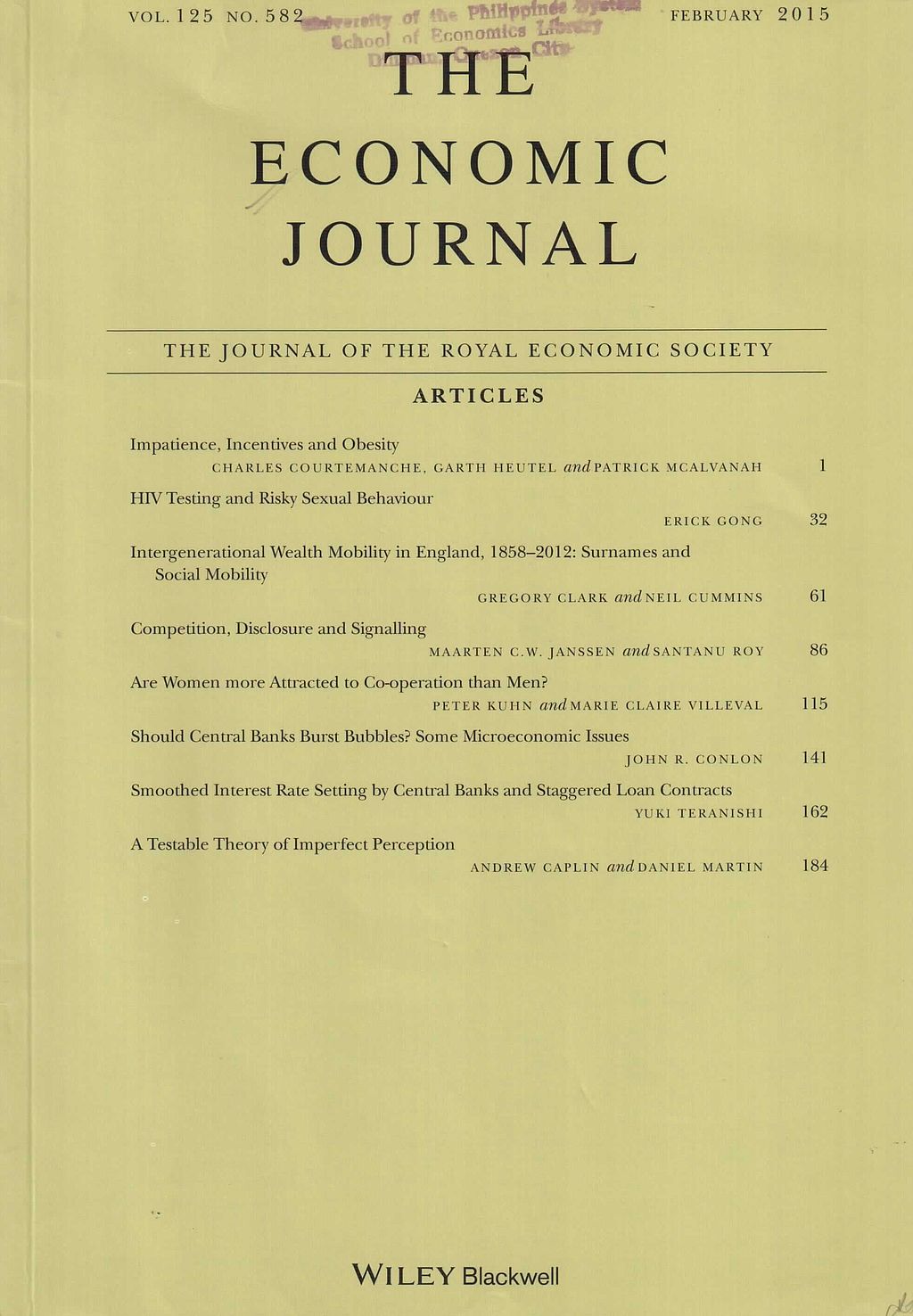
The Productivity Effect of Temporary Agency Work: Evidence from German Panel Data
in: Economic Journal, No. 562, 2012
Abstract
This study investigates the effect of temporary agency work on the user firm’s productivity. We hypothesise that using temporary agency work to enhance numerical flexibility and to screen job candidates may increase productivity, whereas temporary workers’ lower firm-specific human capital and spillover effects on the user’s permanent employees may adversely affect productivity. Other than the sparse existing literature on this issue, we exploit a large panel data set and control for time-invariant and time-varying unobserved heterogeneity by using the system GMM estimator. We find a robust hump-shaped effect of the extent of temporary agency work on the user firm’s productivity.
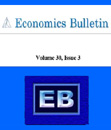
Do Women Benefit from Competitive Markets? Product Market Competition and the Gender Pay Gap in Germany
in: Economics Bulletin, No. 2, 2012
Abstract
Using a large linked employer–employee dataset for Germany with a direct plant-level measure of product market competition and controlling for job-cell fixed effects, we investigate whether relative wages of women benefit from strong competition. We find that the unexplained gender pay gap is about 2.4 log points lower in West German plants that face strong product market competition than in those experiencing weak competition, whereas no such link shows up for East Germany.
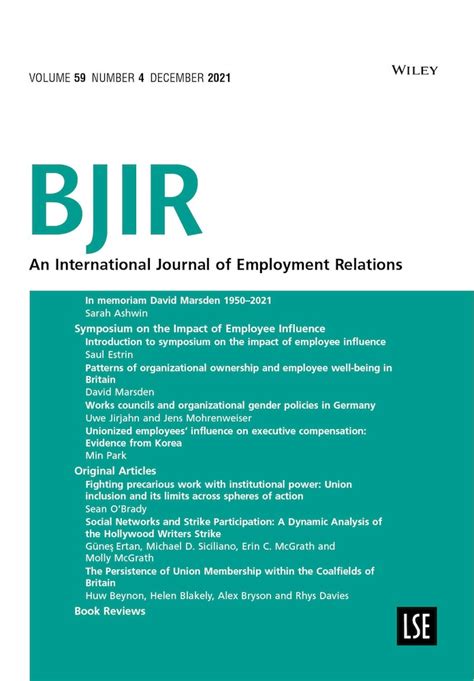
Works Councils and Firm Profits Revisited
in: British Journal of Industrial Relations, No. 1, 2011
Abstract
As they are employee associations, it is typically presumed that works councils redistribute economic rents from firm owners to workers. And indeed, the empirical literature suggests that German works councils reduce profits. The studies on the profitability effect of works councils mainly use self-reported subjective profit evaluations of managers as the dependent variable. I argue that these are poor measures of real profits. Newly available information on firms' capital stock allows me to revisit the profit effect now using an objective profit measure. When utilizing the subjective measure I find the standard results; with the objective measure, however, the works council effect on profits is positive and significant.
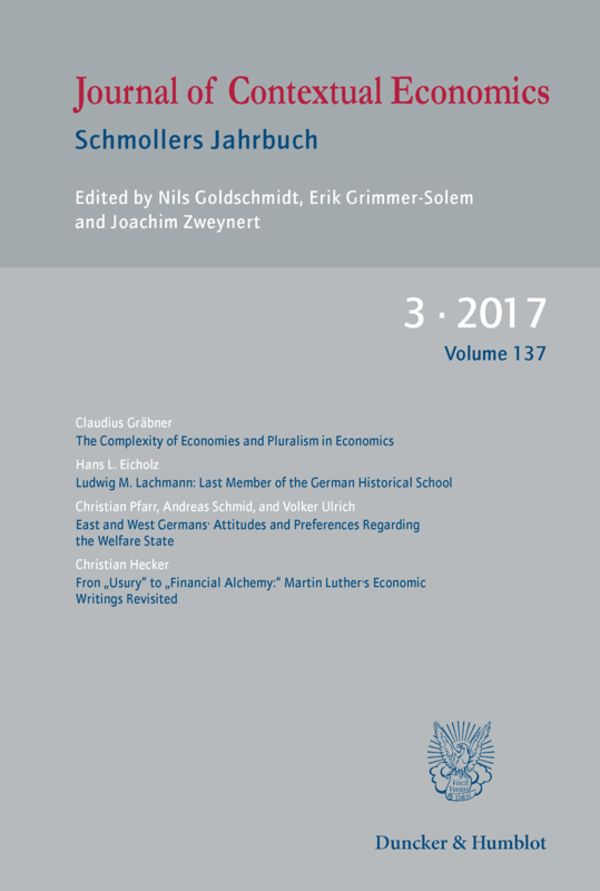
Betriebsräte und betriebliche Produktivität
in: Schmollers Jahrbuch, No. 1, 2011
Abstract
Employee participation via works councils is at the heart of the industrial relations in Germany. Despite considerable research, there is still no consensus on the effect works councils exert on establishment productivity. I estimate the statistical relationship between works council existence and establishment productivity using the most recent information from the IAB establishment panel and find that works council existence is related with a nine percent higher productivity. Based on the results of earlier studies, it is argued that the productivity effect of works councils exceeds the estimated statistical relationship.
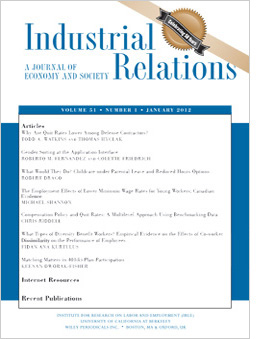
Works Councils and Separations: Voice, Monopoly, and Insurance Effects
in: Industrial Relations, No. 4, 2010
Abstract
Using a large linked employer–employee data set for Germany, we find that the existence of a works council is associated with a lower separation rate to employment, in particular for workers with low tenure. While works council monopoly effects show up in all specifications, clear voice effects are only visible for low tenured workers. Works councils also reduce separations to nonemployment, and this impact is more pronounced for men. Insurance effects only show up for workers with tenure of more than 2 years. Our results indicate that works councils to some extent represent the interests of a specific clientele.
Working Papers
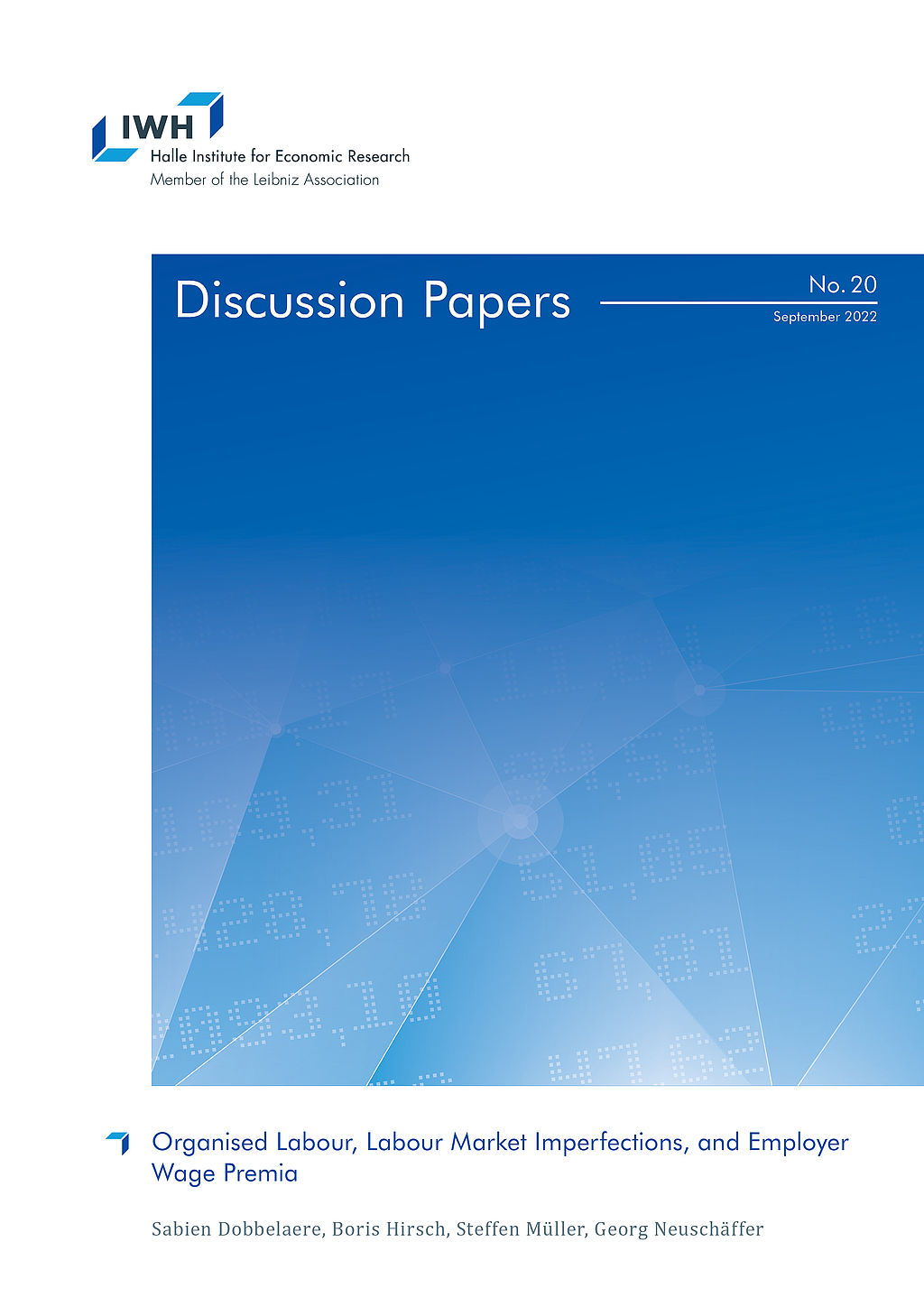
Organised Labour, Labour Market Imperfections, and Employer Wage Premia
in: IWH Discussion Papers, No. 20, 2022
Abstract
This paper examines how collective bargaining through unions and workplace co-determination through works councils relate to labour market imperfections and how labour market imperfections relate to employer wage premia. Based on representative German plant data for the years 1999–2016, we document that 70% of employers pay wages below the marginal revenue product of labour and 30% pay wages above. We further find that the prevalence of wage mark-downs is significantly smaller when organised labour is present and that the ratio of wages to the marginal revenue product of labour is significantly bigger. Finally, we document a close link between labour market imperfections and mean employer wage premia, that is wage differences between employers corrected for worker sorting.
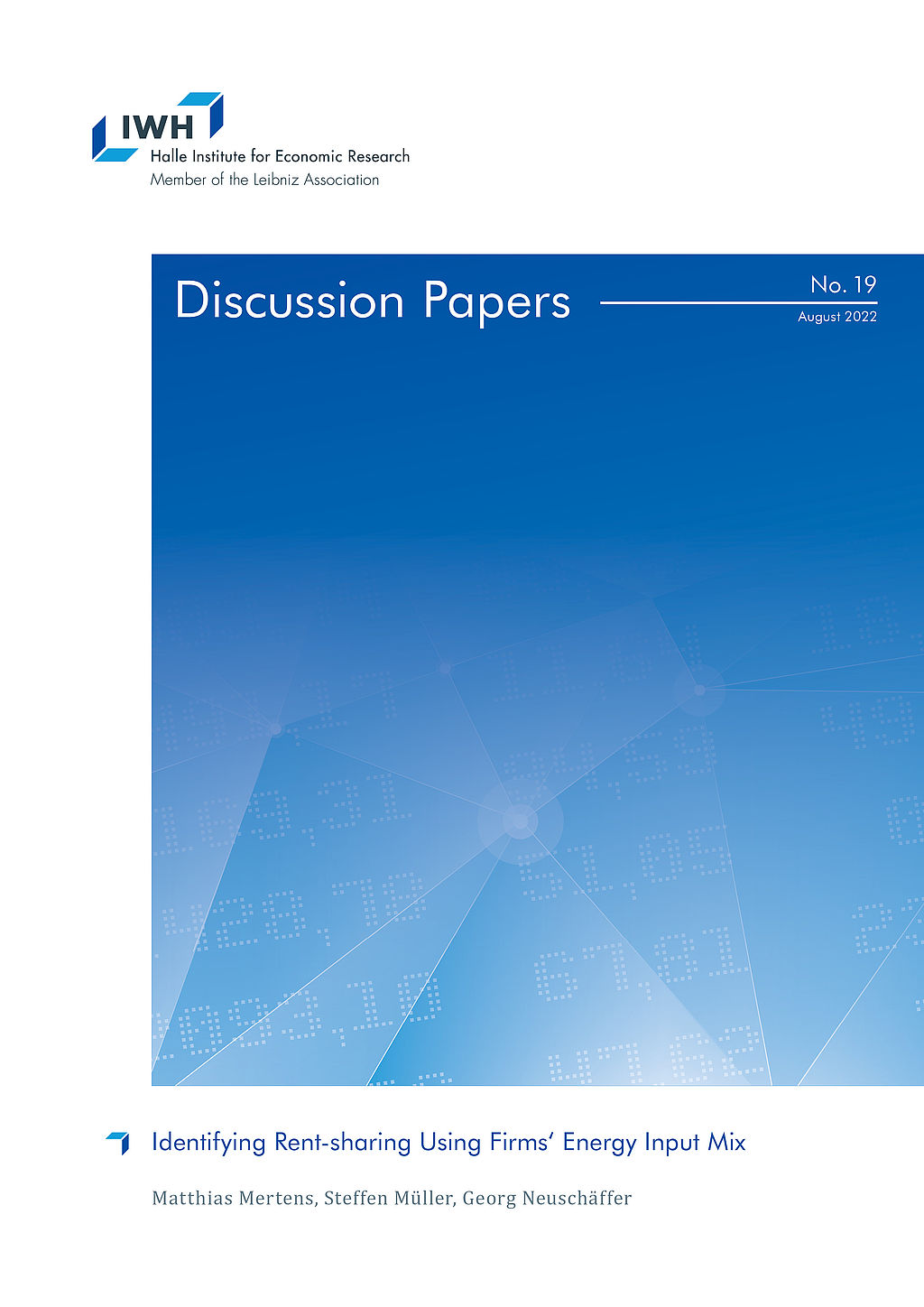
Identifying Rent-sharing Using Firms‘ Energy Input Mix
in: IWH Discussion Papers, No. 19, 2022
Abstract
We present causal evidence on the rent-sharing elasticity of German manufacturing firms. We develop a new firm-level Bartik instrument for firm rents that combines the firms‘ predetermined energy input mix with national energy carrier price changes. Reduced-form evidence shows that higher energy prices depress wages. Instrumental variable estimation yields a rent-sharing elasticity of approximately 0.20. Rent-sharing induced by energy price variation is asymmetric and driven by energy price increases, implying that workers do not benefit from energy price reductions but are harmed by price increases. The rent-sharing elasticity is substantially larger in small (0.26) than in large (0.17) firms.
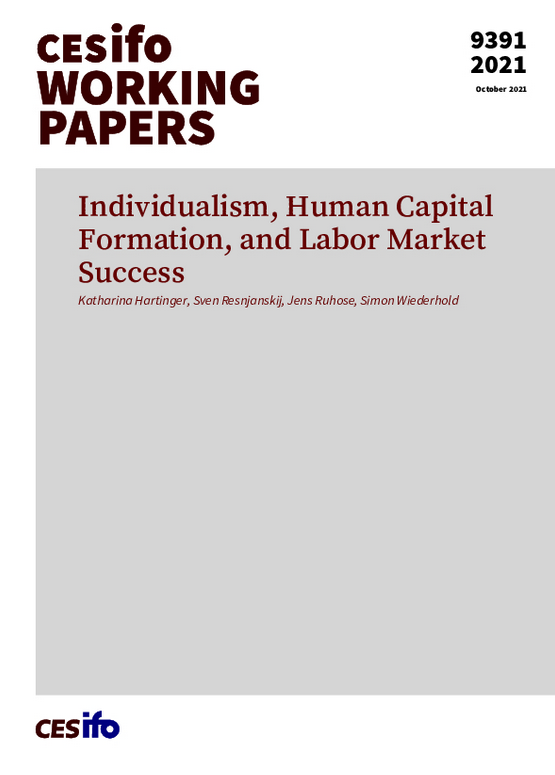
Individualism, Human Capital Formation, and Labor Market Success
in: CESifo Working Paper, No. 9391, 2021
Abstract
There is an ongoing debate about the economic effects of individualism. We establish that individualism leads to better educational and labor market outcomes. Using data from the largest international adult skill assessment, we identify the effects of individualism by exploiting variation between migrants at the origin country, origin language, and person level. Migrants from more individualistic cultures have higher cognitive skills and larger skill gains over time. They also invest more in their skills over the life-cycle, as they acquire more years of schooling and are more likely to participate in adult education activities. In fact, individualism is more important in explaining adult skill formation than any other cultural trait that has been emphasized in previous literature. In the labor market, more individualistic migrants earn higher wages and are less often unemployed. We show that our results cannot be explained by selective migration or omitted origin-country variables.
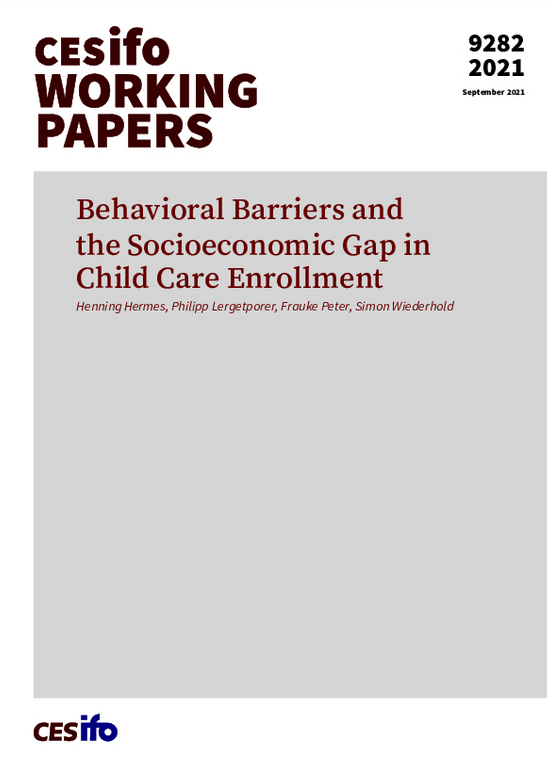
Behavioral Barriers and the Socioeconomic Gap in Child Care Enrollment
in: CESifo Working Paper, No. 9282, 2021
Abstract
Children with lower socioeconomic status (SES) tend to benefit more from early child care, but are substantially less likely to be enrolled. We study whether reducing behavioral barriers in the application process increases enrollment in child care for lower-SES children. In our RCT in Germany with highly subsidized child care (n > 600), treated families receive application information and personal assistance for applications. For lower-SES families, the treatment increases child care application rates by 21 pp and enrollment rates by 16 pp. Higher-SES families are not affected by the treatment. Thus, alleviating behavioral barriers closes half of the SES gap in early child care enrollment.
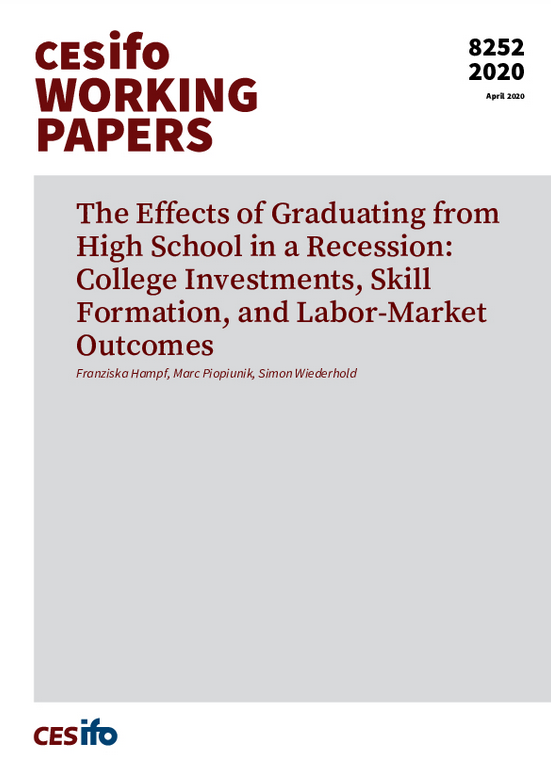
The Effects of Graduating from High School in a Recession: College Investments, Skill Formation, and Labor-Market Outcomes
in: CESifo Working Paper, No. 8252, 2020
Abstract
We investigate the short- and long-term effects of economic conditions at high-school graduation as a source of exogenous variation in the labor-market opportunities of potential college entrants. Exploiting business cycle fluctuations across birth cohorts for 28 developed countries, we find that bad economic conditions at high-school graduation increase college enrollment and graduation. They also affect outcomes in later life, increasing cognitive skills and improving labor-market success. Outcomes are affected only by the economic conditions at high-school graduation, but not by those during earlier or later years. Recessions at high-school graduation narrow the gender gaps in numeracy skills and labor-market success.


















